In the fast-paced world of eCommerce, having a robust and user-friendly online store is essential for success. Whether you’re a seasoned entrepreneur or just starting your online business journey, choosing the right platform to build your eCommerce website is critical.
Apart from coding an online store website from scratch, there are several code-free methods available for regular individuals to build their online store websites easily. The code-free options typically fall into two categories: online website builders known as SaaS website builders (Software as a Service) and Content Management Systems, abbreviated as CMS.
Among these, SaaS Online Website Builders are particularly well-suited for beginners. There are numerous eCommerce website-building platforms available in the market, such as Shopify, Weebly, etc.
With countless options available, finding the perfect online store builder that aligns with your unique needs and goals can be overwhelming. In this article, we’ll explore the top six online store builders that stand out in the eCommerce landscape, each offering a set of features and benefits to help you create a successful online store. So, let’s dive in and discover the tools that can turn your eCommerce dreams into reality.
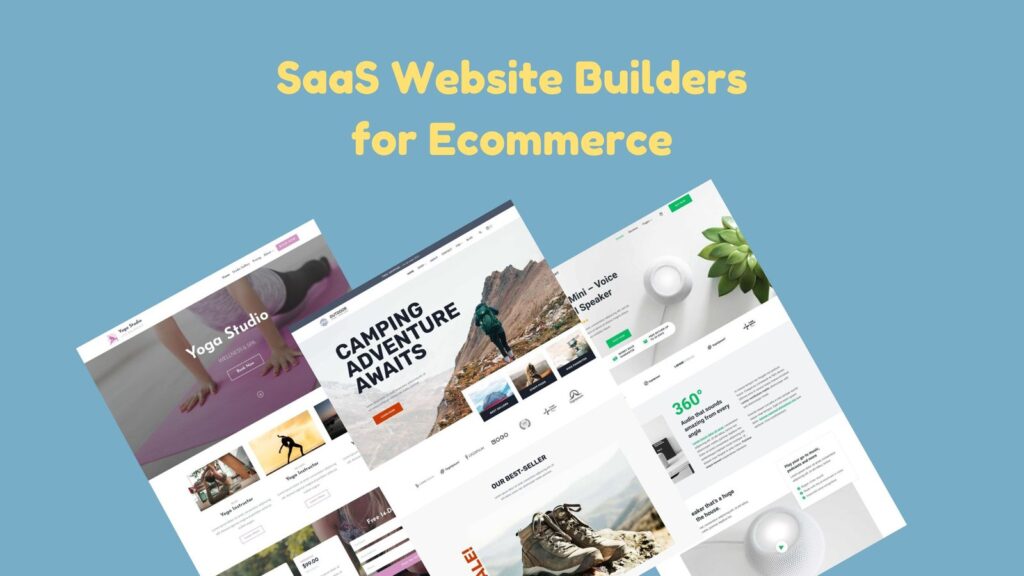
Overview of Saas Website Builders for eCommerce
Please take a look at the list of Online Website Builders for eCommerce below first, The plans listed below are the most affordable options for creating an online store website with a custom domain. You can gain some basic information about these platforms from this list.
The Advantages of Saas Website Builder online
✦ 1. Shopify – Biggest and Most Popular
First and foremost, we have to talk about Shopify. When it comes to eCommerce website building, it’s impossible not to mention Shopify. Originally founded in Canada in 2006 as an online store for snowboarding equipment, little did they know that it would grow to the scale it has today.
Shopify’s websites contributed to an astonishing annual sales figure approaching 400 billion US dollars according to recorded data, in 2022. it has become the most popular and biggest e-commerce SaaS website builder.
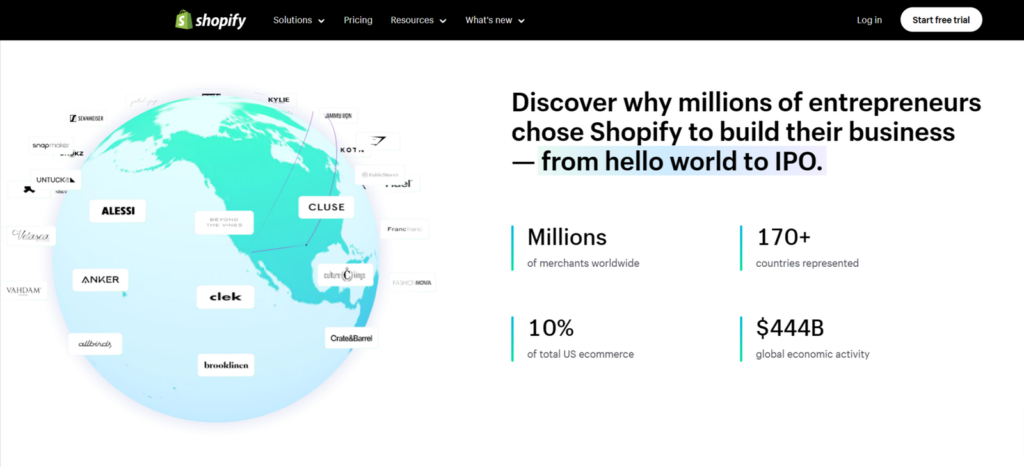
Shopify currently supports over 170 countries worldwide, offering dozens of languages. It’s becoming increasingly user-friendly with a comprehensive and intuitive e-commerce system.
If you’re unsure whether Shopify is right for you, you can start with a 3-day free trial without needing a credit card.
Previously, the free trial was 14 days, but it was changed because they introduced another promotion. After the 3-day free trial, you only need to pay $1/month to start building and running your online store for the next 3 months.
Pricing
Shopify offers 3 plans for building an online store, The basic plan is the best one for most people to start their e-commerce business.
- Subscription Fee: Starting at $39/month, it’s recommended to opt for an annual payment, only $29/mo.
- Domain Fee: Around $15/year, you can register your domain directly through Shopify, or you can register it with a third-party domain registrar, which is usually cheaper. However, you’ll need to know how to connect a domain name to Shopify if you choose a third-party registrar.
- Payment Gateway Fees/rates: Vary for each payment gateway and depend on the one you use.
- Transaction Fee (Commission): If you use Shopify Payments, this fee is 0. For other payment methods, it can go up to 2%, depending on your plan.
Additional Expenses: If you purchase themes or plugins, the cost depends on the theme/plugin provider. We recommend buying themes from Themeforest, where you can get fully-featured themes with multiple templates for around $60.
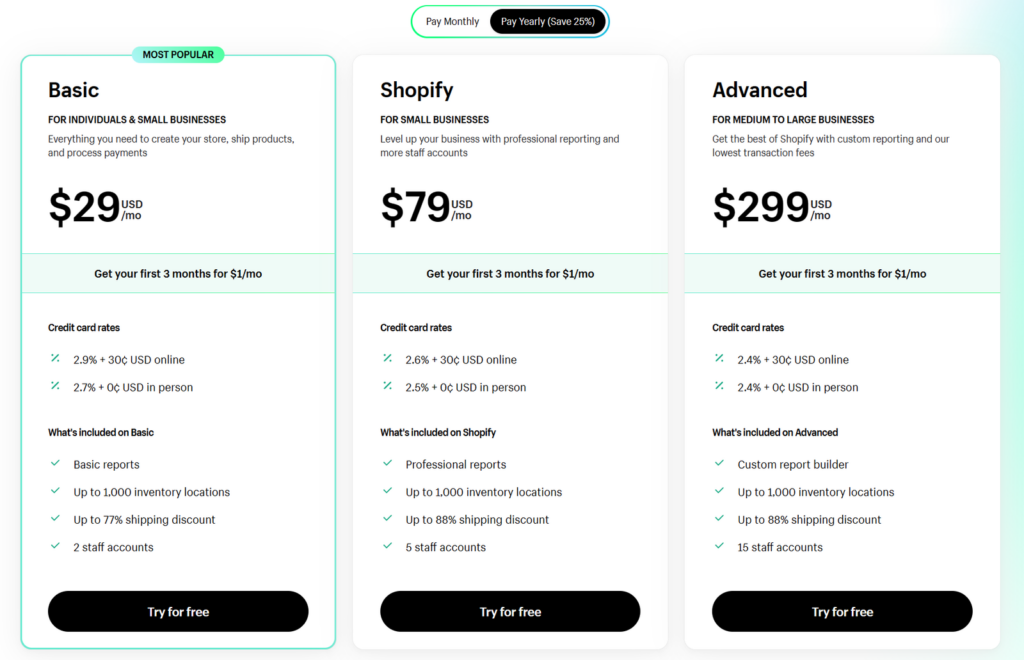
For beginners, the average monthly cost is approximately $30, which is quite affordable for most people. Shopify is arguably one of the most comprehensive e-commerce SaaS website builders in the industry, and this price is definitely worth it.
Shopify’s extensive growth has led to many related products and services thriving alongside it. This includes themes, plugins, and various businesses tailored to Shopify, such as marketing, data sharing, dropshipping, and technologies that uncover popular products and hidden data related to Shopify.
This has also resulted in an increase in junk data in Shopify stores, with various robot users and more. However, you can block these through Google reCAPTCHA.”
✦ 2. Weebly/Square
Weebly was also founded in 2006, but it was established by a group of American students at Pennsylvania State University. They developed their own visual editor for website building back in 2007, somewhat similar to WordPress’s Elementor editor.
However, in 2018, Weebly was acquired by Square Inc., making it a subsidiary of Square. Square itself is a company involved in online website building and payment processing. Whether this merger of Weebly into Square will prove to be a successful combination is still uncertain.
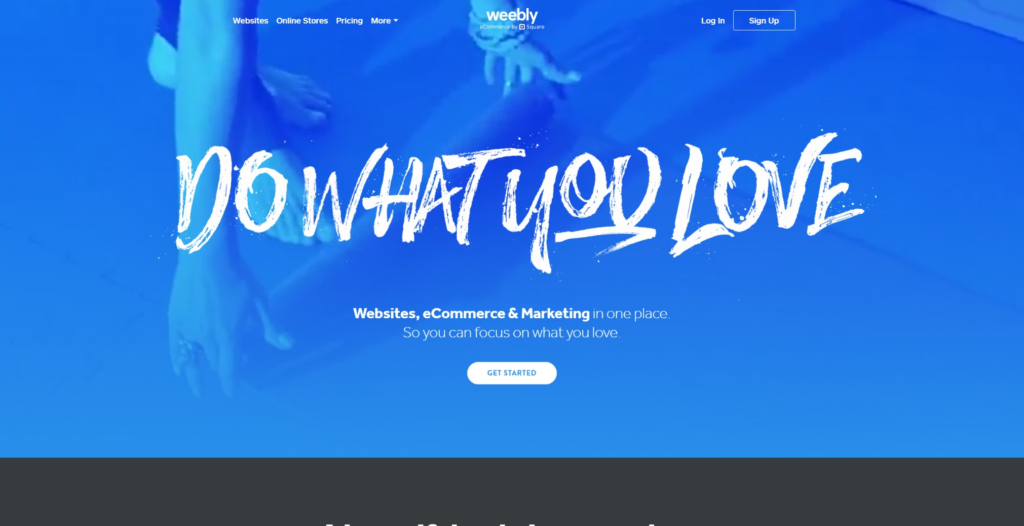
A figure of 50 million websites is quite substantial on Weebly, a fact that might surprise many. This is partly because Weebly offers several low-cost plans, enabling users to create a website for just a few dollars, albeit with limited features.
Unlike Shopify, Weebly offers two website building modes: one for content websites that can’t sell products and another for e-commerce websites. Weebly doesn’t provide a trial option, but it does have a permanently free plan, which likely contributes to the high number of websites created with it.
Weebly also has the advantage of being both a website builder and an online store platform. Many hosting providers can seamlessly integrate Weebly for creating online stores, such as SiteGround and GreenGeeks.
Pricing
Weebly has 4 tiers of Plan for the pricing, you can start with the Personal plan to sell the product.
- Subscription Fee: Starting at $13/month, it’s recommended to subscribe annually for a lower price.
- Domain Fee: Around $15/year, you can register your domain directly through Weebly, they offer a free domain billed annually, or you can also register it with a third-party domain registrar.
- Payment Gateway Fees/rates: Vary for each payment gateway and depend on the one you use.
- Transaction Fee (Commission): 0.
You may need to pay for some premium App(Plugins) or full-featured themes.
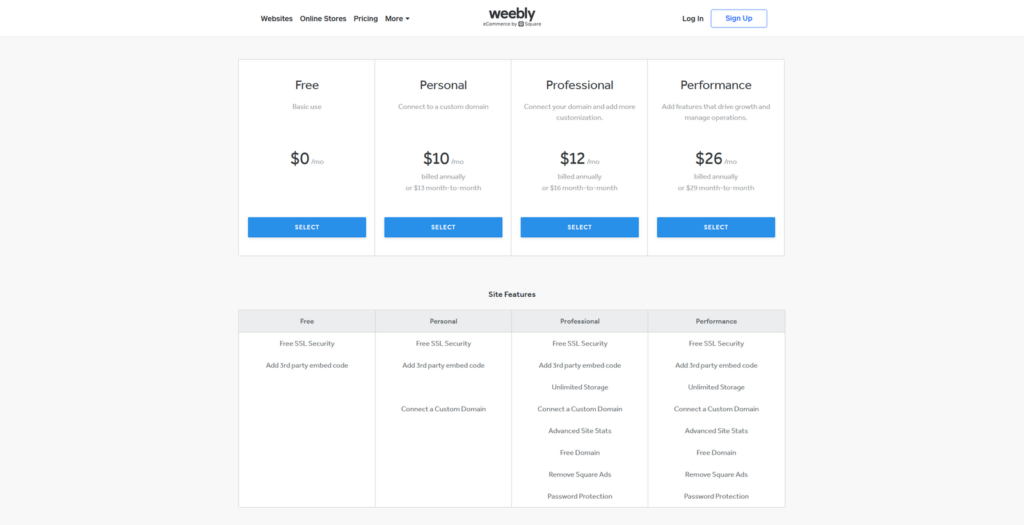
Since its acquisition by Square, Weebly has been undergoing continuous integration of features. However, their backend often redirects to Square, and this integration hasn’t been entirely seamless, which can sometimes be confusing for users. Hopefully, they will complete the integration soon, as Weebly remains a promising platform for building e-commerce websites.
✦ 3. Ecwid/Lightspeed – Easy to sell on any platform
Ecwid is an American e-commerce website builder founded in 2009. It came onto the scene a bit later compared to Shopify and Weebly, but its founder, Ruslan Fazlyev, had extensive experience in the e-commerce field. As early as 2000, he was one of the co-founders of X-Cart, an open-source CMS e-commerce system. Ecwid has been acquired by Lightspeed now.
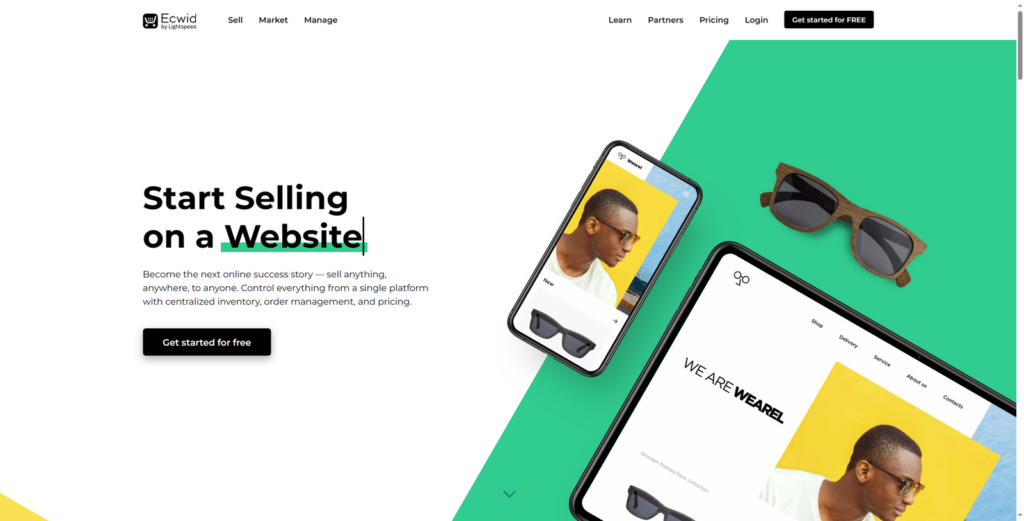
Currently, Ecwid serves over 200,000 websites, spanning more than 170 countries and supporting more than 50 languages. It’s one of the fastest-growing platforms in the new generation of SaaS website builders. One significant difference between Ecwid and other online platforms is its ability to function as an e-commerce plugin integrated into other CMS systems. For example, you can install the Ecwid plugin in WordPress or even in Wix, despite Wix having its own e-commerce system, which is considered somewhat dated.
Although Ecwid may not have as many users as some other platforms, it appears to combine various strengths. It allows you to sell through various channels, including social media, Google, and offline (POS). Its interface is clean and straightforward. Additionally, Ecwid can integrate its own plugins into other CMS systems. Moreover, they offer a wide range of third-party apps or plugins that can be installed on Ecwid websites.
Pricing
Ecwid offers 4 tier plans for the subscription, but if you want to sell products online, you should start with the Venture plan.
- Subscription Fee: Starting at $19/month, it’s recommended to subscribe annually, as the price is lower.
- Domain Fee: Around $15/year, you can register your domain directly through Ecwid, or you can also register it with a third-party domain registrar.
- Payment Gateway Fees/rates: Vary for each payment gateway and depend on the one you use.
- Transaction Fee (Commission): 0.
- Theme fee: 0, the templates are free on Ecwid currently.
You may need to pay for some premium Apps(Plugins).
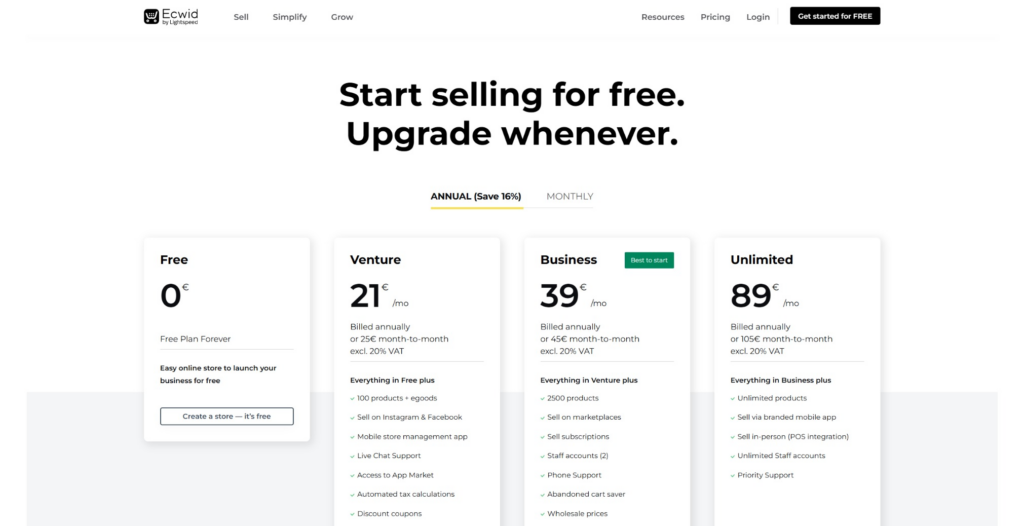
The only potential drawback might be its themes, which are rather simplistic and may lack some features. However, Ecwid follows a lightweight approach, meaning that using Ecwid for website building results in a clean and minimalist appearance but offers versatility in multi-channel sales.
✦ 4. Jimdo – From Germany
Jimdo was founded in Germany in 2007 and has since gained popularity worldwide for its user-friendly approach to website creation. It offers a range of tools and features that make it accessible to beginners and more experienced users.
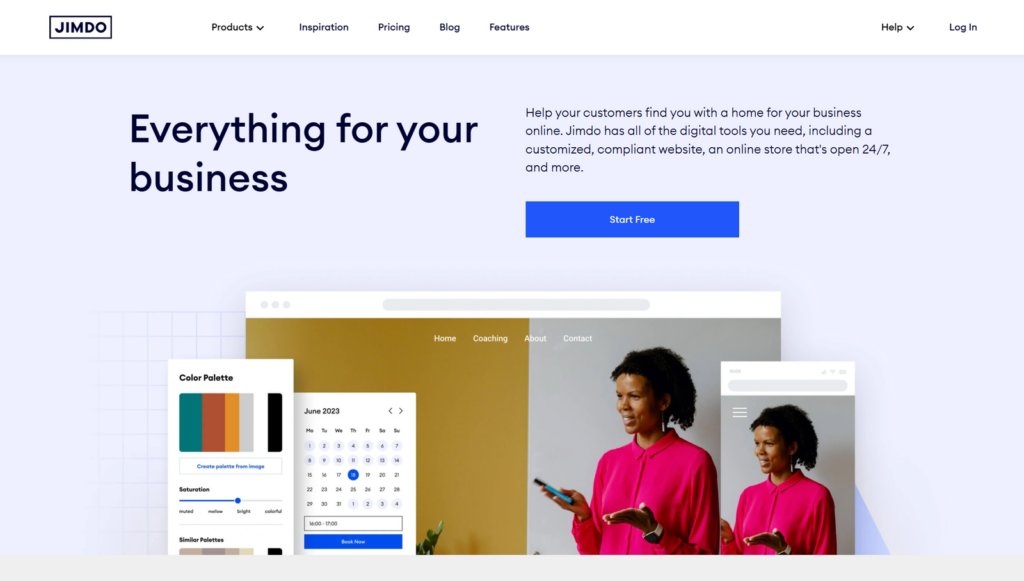
So far, Jimdo has been used to create websites for a minimum of 25 million websites, like Weebly, the free websites included, While this number may not rival Weebly’s data, it’s still a substantial figure and continues to grow.
Jimdo, unlike some other platforms, doesn’t overwhelm users with fancy features. In this aspect, it’s similar to Ecwid. However, Jimdo still offers a range of useful functionalities. These include features like free custom business email, access to a free image library, the ability to design a logo for free, and the option to create email forms. It also supports multiple sales channels, such as Google, Facebook, Instagram, and more.
Pricing
Jimdo offers plans for both normal websites and Online Stores, for an e-commerce website, you can pick the Business plan to start.
- Subscription Fee: Starting at $18/month for Online Store, I recommend you to subscribe annually, for a lower price.
- Domain Fee: Around $15/year, you can register your domain directly through Jimdo, they also offer a free domain if you subscribe to the plan annually, or you can also register it with a third-party domain registrar.
- Payment Gateway Fees/rates: Vary for each payment gateway and depend on the one you use.
- Transaction Fee (Commission): 0.
- Theme fee: 0, like Ecwid.
You may need to pay for some premium Apps(Plugins).
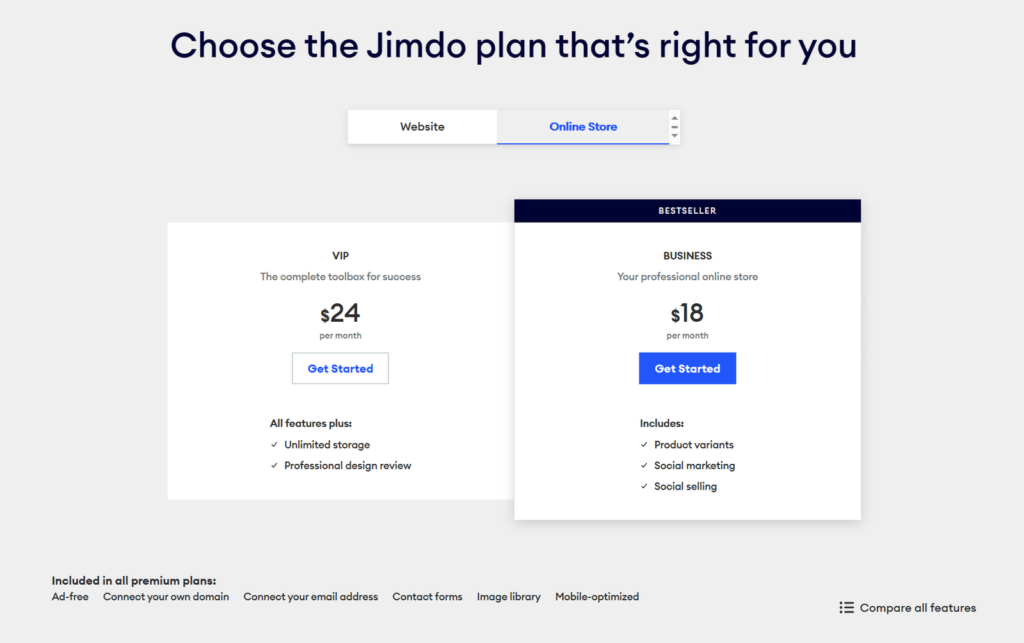
Overall, Jimdo is a versatile website builder that caters to a wide range of users, from small businesses and entrepreneurs to individuals looking to create personal websites or portfolios. Its simplicity and affordability make it an attractive choice for those looking to establish a web presence quickly and easily.
✦ 5. Shopline
Shopline was founded in Hong Kong in 2013 and has become a popular eCommerce solution, primarily in the Asia-Pacific region. It is tailored to the needs of businesses and entrepreneurs looking to establish and grow their online presence.

Shopline shares many similarities with Shopify in various aspects, offering a wide range of features, and similar pricing for plans. Many of its marketing functionalities become available when you subscribe to higher-tier plans. However, it’s worth noting that some individual features may require separate payments.
Additionally, Shopline supports product imports from Shopify, making it a suitable choice if your customer base primarily resides in the Southeast Asian region. They have developed specific features tailored to meet the needs of Southeast Asian users, making it a favorable platform in that regard.
Shopline ensures that websites built with their platform are mobile-responsive, providing an optimal shopping experience for customers on smartphones and tablets.
Pricing
Shopline offers 3 plans for building an online store, you can start to build an online store with the Starter plan.
- Subscription Fee: Starting at $29/month, but if you want to subscribe to a plan annually, you need to start with the 2nd tier plan “Essential”.
- Domain Fee: Around $15/year, you can register your domain directly through Shopline, or you can purchase a domain name from other domain registrars, which offer low prices.
- Payment Gateway Fees/rates: Vary for each payment gateway and depend on the one you use.
- Transaction Fee (Commission): Shopline will charge you transaction fees without using SHOPLINE Payments, different fee rates for different plans
- Themes/Templates: 0,
Additional Expenses: If you purchase other Apps or services, such as email marketing, you will need to pay extra.
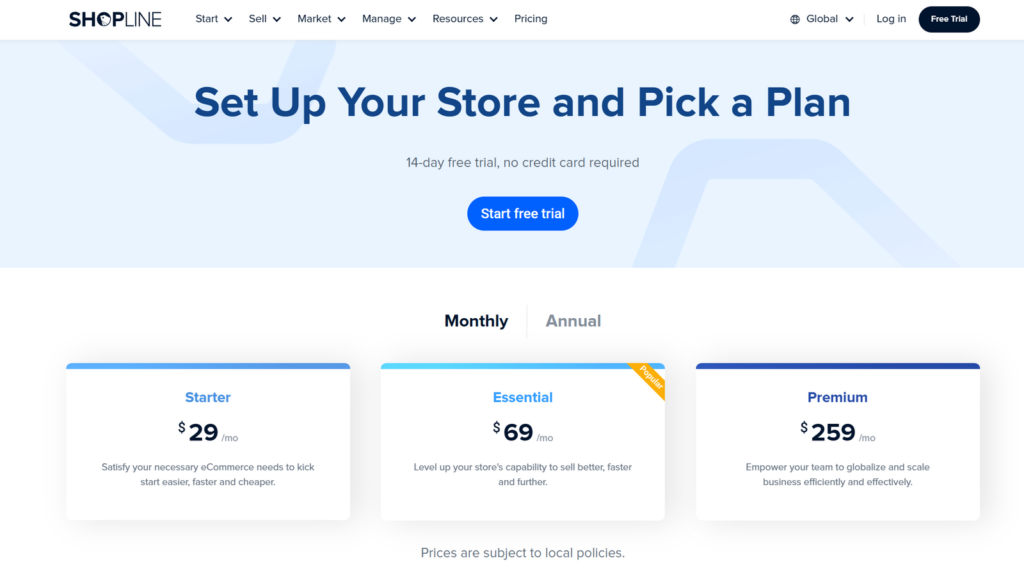
Shopline understands the specific needs and preferences of this market. It strives to empower businesses with the tools and resources they need to succeed in the competitive eCommerce landscape. Whether you’re a small business owner or a larger enterprise, Shopline provides the infrastructure to establish and grow your online store.
✦ 6. Squarespace
4.5![]()
Pros
Cons
Sale: ✨ 14 Days Free Trial →
Squarespace is another professional web development company that was established in 2003, which is quite early in the industry, even earlier than WordPress. Compared to the platforms mentioned above, it’s considered a veteran in the field. This company is multinational, with its headquarters in New York and offices in Dublin, Ireland.
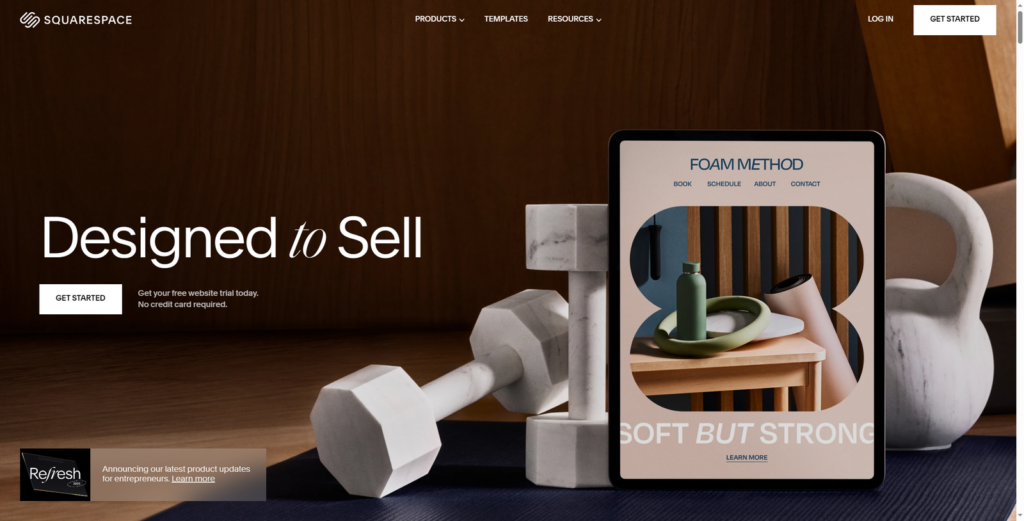
According to their data, they have hosted over 1 million websites on their platform to date, and they support multi-channel selling. Squarespace also provides built-in SEO tools and offers a year of free Google Workspace email. Furthermore, their email marketing system is included without additional charges.
Squarespace utilizes a page editor called the blueprint, the version is Squarespace7.1 in2023, which empowers users to create entirely unique page designs. Of course, you can also opt to use templates from their template library to build your website, the appearance style is similar to Ecwid and Jimdo and follows a clean and modern design style.
In other aspects, it excels as well. Nowadays, almost all platforms have their own third-party plugin markets where users can purchase additional plugins to extend functionality, and Squarespace is no exception.
Pricing
Squarespace offers pricing options divided into four tiers, allowing you to choose based on your specific needs. However, if you’re looking to establish an online store, it’s advisable to start from the second tier “Business” and upwards. In fact, they do provide a free plan, but it comes with limitations, such as not being able to connect your own domain, similar to platforms like Ecwid, Jimdo, and Weebly.
- Subscription Fee: Starting at $33/month for Online Store, but the price is lower if you subscribe to the plan annually.
- Domain Fee: Around $15/year, Like Weebly and Jimdo, Squarespace also offers a free domain if you subscribe to the plan annually, or you can register it with a third-party domain registrar too.
- Payment Gateway Fees/rates: Vary for each payment gateway and depend on the one you use.
- Transaction Fee (Commission): 0.
- Theme/Template fee: 0.
You may need to pay for some premium Apps(Plugins).
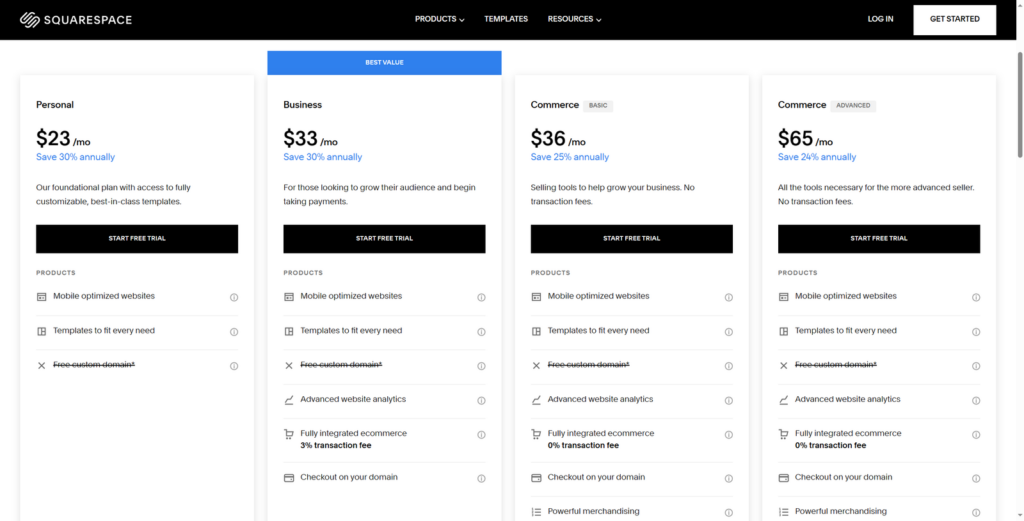
Whether you’re a beginner or an experienced web designer, Squarespace offers a user-friendly experience with all the features you need to create a professional online presence. It’s an excellent choice for those looking to build aesthetically pleasing and functional websites without the hassle of coding.
Other Saas Online Website Builders
In addition to the aforementioned SaaS website builders for eCommerce, there are, of course, many other eCommerce website-building platforms available. However, the ones mentioned above are some of the more popular and representative options. Here are a few other well-known online eCommerce website-building platforms worth considering:
Hostinger Website Builder
Hostinger Website Builder is an easy-to-use tool for creating professional websites without any coding skills, it is an online website building solution developed by Hostinger, and supported by Hostinger hosting services. Hostinger Website Builder is probably the most affordable SaaS website-building platform I’ve seen so far.
Shoplazza
This platform is often compared to Shopify and was founded in Canada. It’s believed to have been created by Chinese individuals and primarily serves customers in mainland China. It aligns well with the preferences of Chinese merchants.
Wix
Originating from Israel, Wix is a widely recognized SaaS website builder with over 200 million websites created on its platform, it is even more big and famous than Shopify. I didn’t list it above in this article because the primary focus here is on online store website-building platforms.
While it also offers eCommerce capabilities, it’s not the primary focus of this article. Wix is known for its drag-and-drop website building but may not be as user-friendly for eCommerce as some other options.
Bigcommerce
As the name suggests, Bigcommerce is an eCommerce-centric platform. While initially focused on B2B, they have expanded into B2C eCommerce. It offers features and pricing similar to Shopify, making it a suitable alternative.
Volusion
Volusion, a company with a long history dating back to 1999, has made its mark in the industry. Despite facing competition from newer entrants, Volusion remains known in the e-commerce field and can still be found on many rankings and reviews.
Summary
In conclusion, the journey to establishing a successful eCommerce website is paved with choices, but our exploration of the top 6 SaaS website builders has illuminated some remarkable options. Each of these platforms offers a unique set of features and benefits, catering to the diverse needs of aspiring online retailers.
The best SaaS website builder for your eCommerce endeavor ultimately depends on your unique goals, preferences, and the market you target. Armed with the insights from this article, you’re better equipped to make an informed decision that aligns with your vision. As you embark on your eCommerce journey, may your chosen builder empower you to create a thriving online store and capture the vast opportunities in the digital realm.
Remember that the “best” e-commerce website builder is the one that best suits your specific needs and goals. Take your time to research and test the platforms if possible before making a final decision. Your chosen builder should empower you to create a successful and profitable online store.









